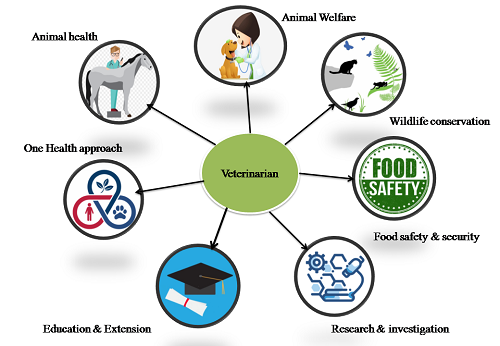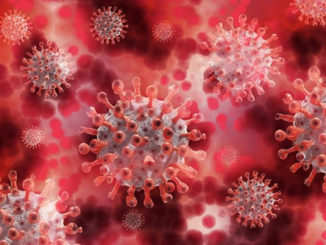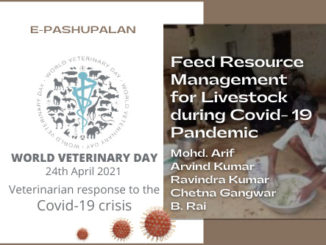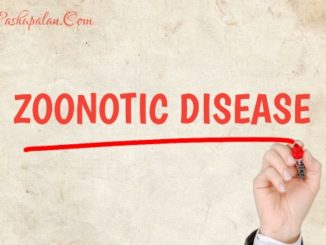Starting in early 2020 the outbreak of COVID-19 has spread like a wildfire all over the globe. Corona virus disease is caused by the Severe Acute Respiratory Syndrome Coronavirus 2 (SARS-CoV-2). The pandemic believed to originate from the wet markets of Wuhan city in South China in December, 2019 and has spread around the world in a short period of time. As of 30th march, 2021 more than 128 million cases have been confirmed, with more than 2.8 million deaths attributed to this pandemic. During the COVID-19 crisis, strict restrictions on lockdowns halted and disrupted the daily routine of people around the country. Only essential facilities have been permitted to remain functional. Despite all of these unusual circumstances, there are things that cannot be overlooked – one of them is the welfare of our animals. Veterinarians have a vital role to play in caring for our livestock and

companion animals. In addition to other key frontline facilities, veterinarians were also engaged during the global pandemic. The Govt. of India on suggestions from Ministry of Fisheries, Animal Husbandry and Dairying and Animal Welfare Board of India (AWBI) to include veterinary services as essential and directed all states to exempt veterinary services from lockdown.
COVID-19 & veterinary services
The global pandemic not only affected humans but animals were suffered too. It has had an effect on the welfare and well-being of all species, including livestock, domesticated pets and wildlife. Some countries have registered a rise in the rate of adoption of pet animals, while in some countries the animals have been discarded due to fear of transmission of the virus from animals or because their owners were infected. Livestock and zoo animals have also endured, mostly as a result of food scarcity, veterinary services and staff. The suffering of animals was quite alarming due to scarcity of feed and fodder due to strict restrictions in movement of goods and vehicles in the country. In order to worsen the scenario, incidents such as Australian wildfires or India’s Simlipal wildfire threatening wildlife have exacerbated the woes. However, veterinarians successfully mitigated the problems being in the frontier serving animal welfare. Even in the lockdown, the vets offered their services for the monitoring of diseases and the treatment of animal suffering. They provide veterinary and surgical care in veterinary clinics, mobile clinics, zoos, farms and even on the doorstep in the event of an emergency. Govt. of India mentioned and enumerated 28328 vets and 54928 paravets as COVID warriors serving for the welfare of animals during COVID lockdown. Online consultations or telemedicine services were of great help during the time of distress when physical interaction was restricted. One Such example includes veterinarians in Bengaluru launched “Dial-A-Vet”, a telemedicine service to enable the clients to avail veterinary services during lockdown. Video-chat feature also enable the vets to observe the patient as well interact with the clients.
Ensuring food safety
COVID-19 is assumed to originate from the wet markets of China and has a negative impact on meat production and consumption. As a result of the COVID-19 pandemic attributed to the wet market and live slaughter markets, the fear of COVID-19 spreading from livestock and meat consumption has been widespread. Sales and consumption patterns of meat and animal products have had a poor impact on the income of livestock farmers. The price of chicken and eggs hit low during COVID panic. The role of animals in transmitting is, however, negligent.
Veterinarians thus took center stage to debunk the rumour that food posed any threat to human health. They assured food safety by ensuring that only healthy animals and their products entered the food supply. Veterinarians provide expertise in the field of food safety by applying their knowledge in meat processing, food safety, epidemiology and biosecurity. Premiere veterinary institutes such as Indian Veterinary Research Institute (IVRI), National Dairy Research Institute (NDRI) released guidelines regarding COVID-19 for dairy farmers, livestock farmers, pet owners, slaughter houses and processing plants, animal product consumers and general public.
Enforcing One Health
COVID-19 is most likely thought to be a zoonotic disease due to the spread of the SARS-CoV-2 virus from wild animals to humans. Veterinary experts, along with biomedical researchers, have joined forces to address the global challenge. The direction of biomedical research across the globe has moved to the production of COVID-19 vaccines. Albert Bourla, a veterinarian working as CEO of the American Pharmaceutical Company “Pfizer” contributed to the launch of one of the first COVID-19 vaccinations for immunisation. Veterinarians are also being assigned for COVID-19 testing as the veterinary institutes and disease investigation laboratories are well-equipped with bio-safety labs and PCR machines. Veterinarians’ expertise in working with zoonotic diseases has allowed COVID testing in various Veterinary institutes of the country. Veterinarians, aside from taking care of animal health and wellbeing, also monitor the integrity of public health, avoid outbreaks of zoonotic diseases and ensure food safety.
Steps to be taken by veterinarians during COVID-19 pandemic
- Ensure proper precautionary clothing such as face mask, sterile gloves, PPE kits etc.
- Limiting staff and client person-to-person exposure in clinics or farms.
- Prioritizing urgent or emergency cases and postponing elective or routine visits.
- Daily screening of temperature and maintaining social distancing (1 metre).
- Carrying a valid and approved ID while on visit to clinic or patient site to avoid lockdown circumstances.
- Installing Govt. issued mobile application such as “Aarogya Setu” to ensure personal safety and national obligations.
- Screening animals for exposure to COVID-19 suspected or affected person.
- Clean and disinfect room, surfaces, supplies, floors, equipments and premises of farm, or clinics.
- Encourage the use of hand sanitizer or handwash personally and to the clients.
- Eradicate any rumours and educate people regarding COVID-19.
Conclusion
Veterinarians working together will minimize the impact of COVID-19 on animals. This may not be the last pandemic, but it is clear that veterinarians will anticipate and plan accordingly for any potential threats. They unite in solidarity with medical practitioners and collaborate for the collective vision of One Health. Many vets are leading the COVID task forces globally and thus affirm their position as key players in the implementation of One Health Theory.






Well written Doc.saab
Good one